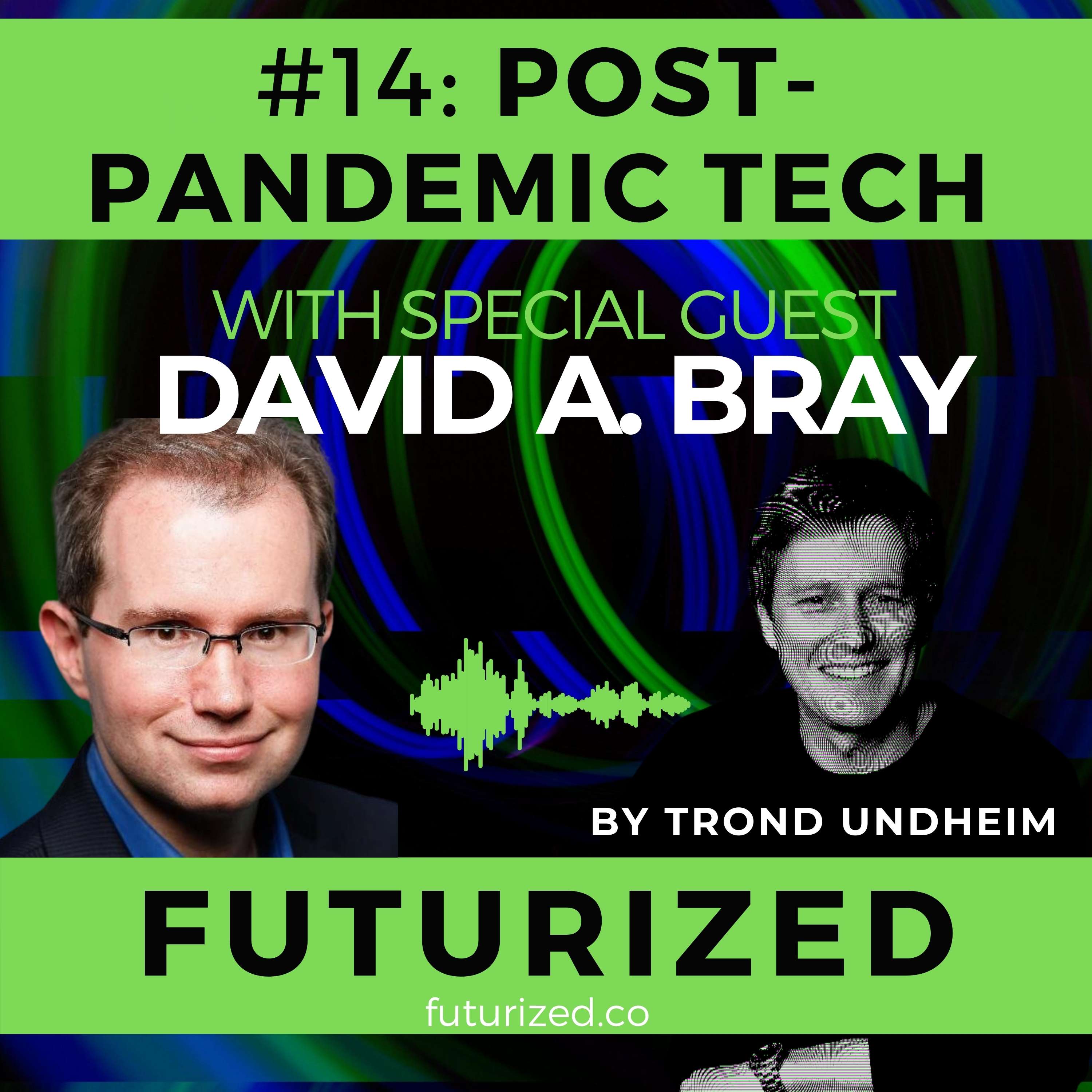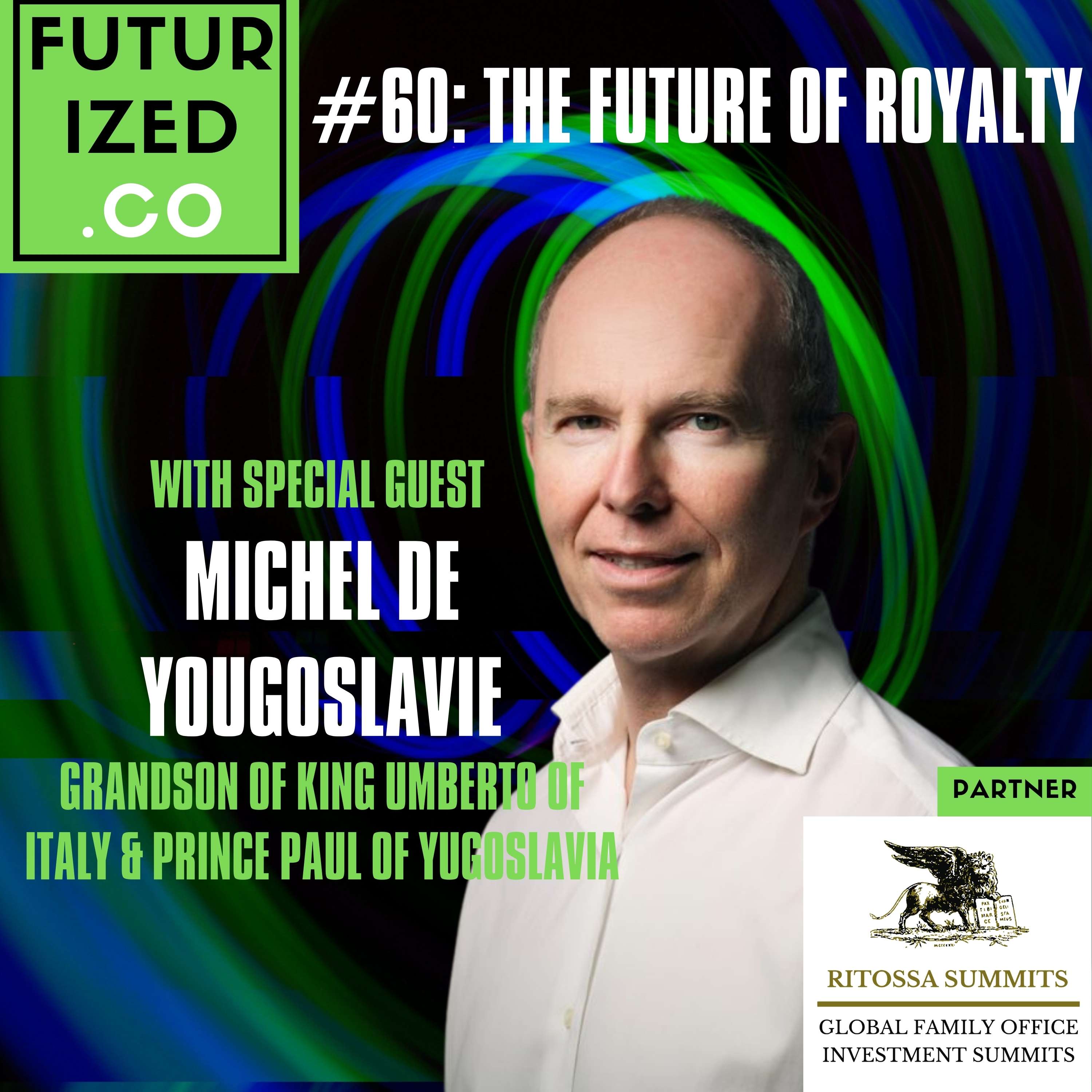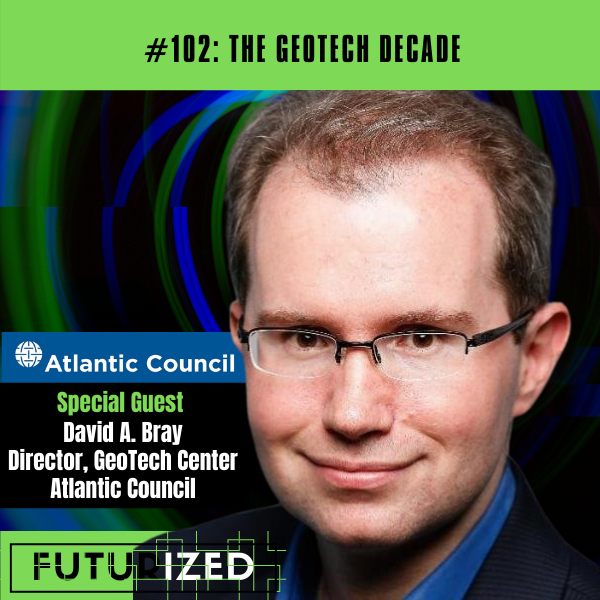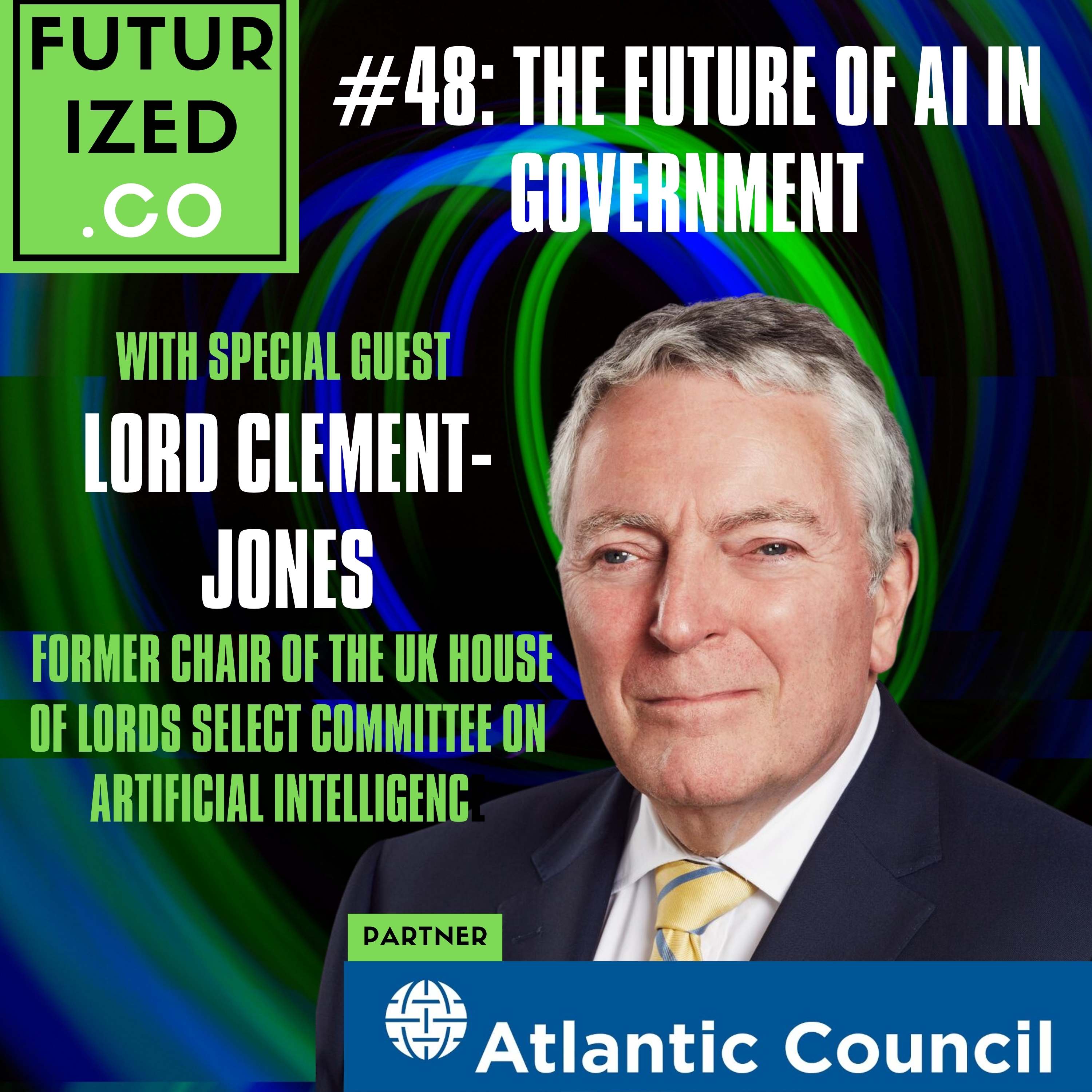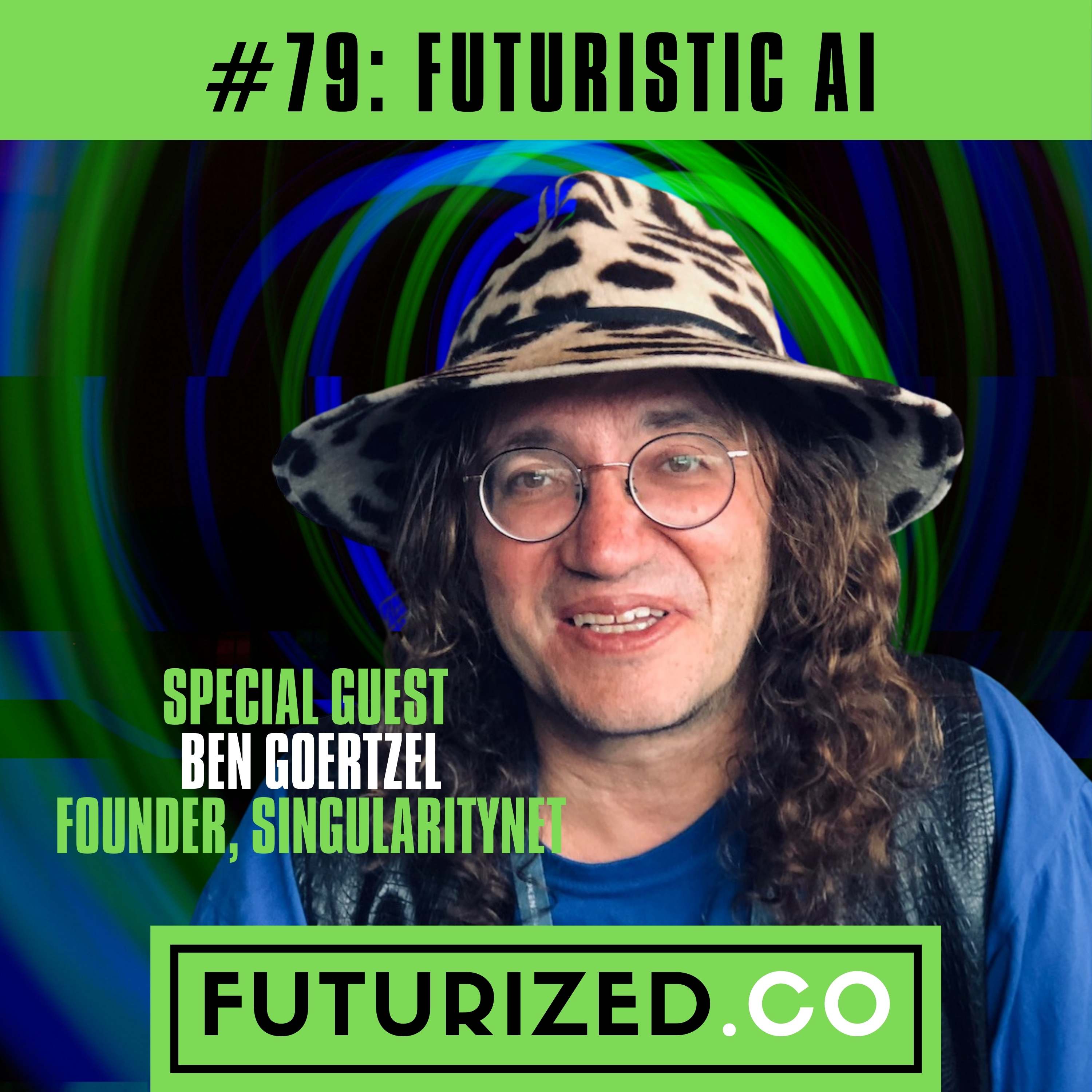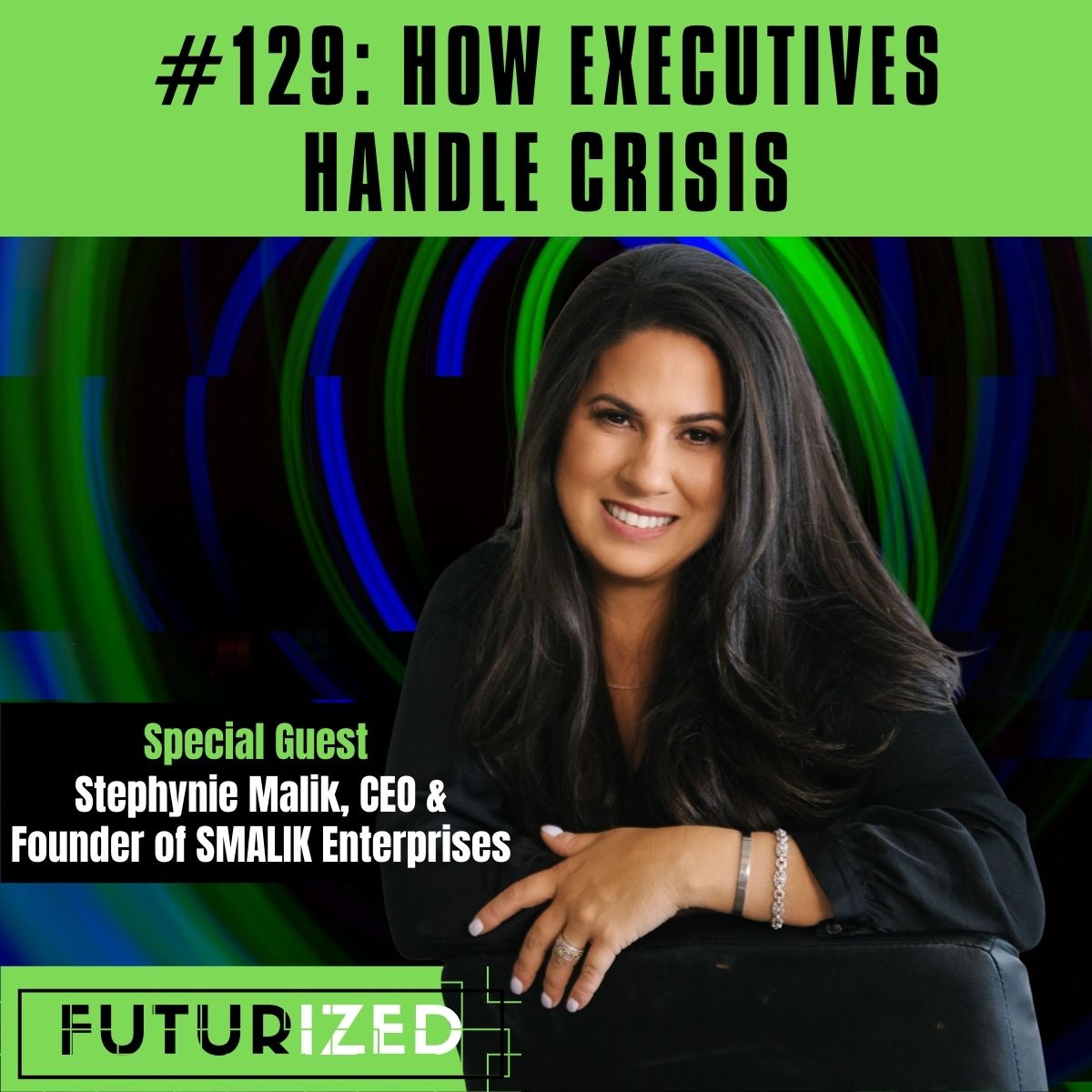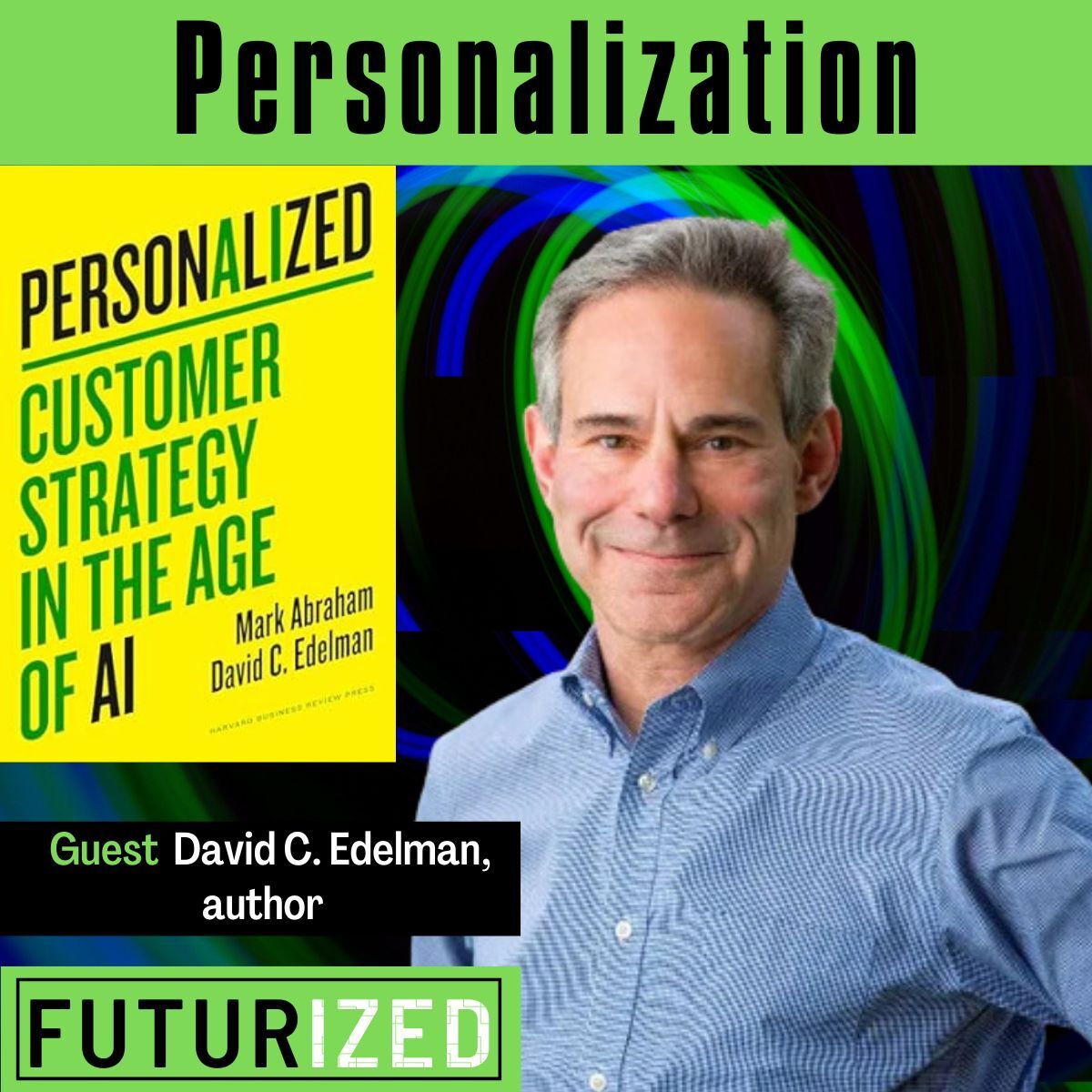Workforce, Humanity, and Future Tech
Alexandra Levit, 8x author, speaker, and career expert, interviewed by Trond Undheim, futurist and author.
In this conversation, we talk about the future of careers and strategic HR. We discuss a recent book by Levit: Humanity Works: merging tech and pe...
Alexandra Levit, 8x author, speaker, and career expert, interviewed by Trond Undheim, futurist and author.
In this conversation, we talk about the future of careers and strategic HR. We discuss a recent book by Levit: Humanity Works: merging tech and people for the workforce of the future (2019). Alexandra and I agree that there is lots of work required to integrate tech in the workforce. Paradoxically, it requires hard, human work to adapt to new realities. We then discuss a brand new book penned by myself, Trond Undheim: Future Tech: how to capture value from disruptive industry trends--a framework for understanding tech/society (2021). We talk about the trends of co-working, remote work, portfolio careers, gig economy, design thinking, workplace culture, experience retail, applied tech skills, the importance of training. We also discuss the future and what that entails for the workforce and for how technology will evolve.
Having listened to this episode, check out Humanity Works, Future Tech as well as Alexandra Levit and Trond Undheim's online profiles:
- Humanity Works: https://www.amazon.com/Humanity-Works-Merging-Technologies-Workforce/dp/0749483458
- Future Tech: https://www.amazon.com/Future-Tech-Capture-Disruptive-Industry/dp/1398600326
- Alexandra Levit (LinkedIn, Twitter: @alevit): https://www.alexandralevit.com/
- Trond Undheim (LinkedIn, Twitter @trondau): https://trondundheim.com/
My takeaway is that paradoxically, the future of technology is not so much about tech as it is about getting the human part right. We need to train, retrain, and adapt. We will spend more time doing that than actually developing new technology. Also, successful technology requires being in close touch with its prospective users. Failing that, technology fails. The Future of work can be bright for young people if they are proactively explore the opportunities in front of them. Conversely, the world we have already entered rewards creativity and initiative. Without that, any trend, technology or otherwise, will come as an unpleasant surprise.
Thanks for listening. If you liked the show, subscribe at Futurized.org or in your preferred podcast player, and rate us with five stars.
If you like this topic, you may enjoy other episodes of Futurized, such as episode 49, Living the Future of Work, episode 41, The Future of Work, or episode 71, Future Tech - a preview. Keep in mind that so far, there are over 20 episodes of Futurized that tackle the Future of Work, so you may wish to browse more episode using the categories and search function provided on the Futurized.org website.
Futurized—preparing YOU to deal with disruption.
Workforce, Humanity, and Future Tech_mixdown
Trond Arne Undheim, Host: [00:00:00] Futurized goes beneath the trends to track the underlying forces of disruption in tech policy, as this model, social dynamics and the environment. I'm your host, futurist and author. In episode 94 of the podcast, the topic is workforce humanity and future tech. Our guest is Alexander Levitt, eight X author, speaker, and career expert.
[00:00:25] In this conversation, we talked about the future careers and strategic age. We discussed a recent book by 11 called humanity, works, merging tech and or the workforce of the future. Alexandra and I agreed that there was lots of work required to integrate tech into workforce. Paradoxical requires hard human work and adapt to new realities.
[00:00:49] We then discuss a brand new book pen by myself called future tech. How to capture value. From disruptive industry trends, which is a framework for understanding in society. We talk about the trends of co-working remote work portfolio, careers, gig economy, design thinking, workplace culture, experienced retail, applied tech skills and the importance of training.
[00:01:14] We also discussed the future and what that entails for the workforce and for how technology will. Alexandra. How are you
[00:01:22] Alexandra Levit, author (guest): [00:01:22] today? I'm so good. Thanks for having me today. It's really good to be here talking to you.
[00:01:27] Trond Arne Undheim, Host: [00:01:27] Yeah, likewise, this is going to be wonderful. I'm super excited to meet someone who among lots of other things.
[00:01:33] There are so many impressive things about you that I I'm in. Awe. I want to just mention two things before I get into your actual background. I love that you were written at least in my account, eight books, and I love that you have 120,300 Twitter, Twitter followers. I love a lot of other things about exactly.
[00:01:52] So you've done a lot in your life, but I would say those two accomplishments stand out to me. I wanted to, to acknowledge a couple of things. First of all, you started out as a competitive bowler as a child. This must explain everything,
[00:02:07] Alexandra Levit, author (guest): [00:02:07] explains everything well, truthfully, I enjoyed bullying when I was very young and I was this tiny person listening just on a podcast.
[00:02:15] You can't see how small I am, but as an adult human I'm about just shy of five feet. And so I was an even smaller child. And so I had this six pound bowling ball. And when you only have a six pound ball, you can't rely on brute force. In order to make an impact. So you have to learn form because you've got to get that ball going in exactly the right direction.
[00:02:34] It's not just going to knock down the pins because you're throwing it really hard. Right. So that was how I got into the world of competitive bullying, which is a child is slightly different, but it was a lot of fun. I did it for a couple of years and, and I enjoyed it.
[00:02:50] Trond Arne Undheim, Host: [00:02:50] Look, this explains a lot to me. I hope we can get back to this, but basically then high school in Maryland, BA for Northwestern, industrial psychology.
[00:02:57] I understand which it also explains a little bit, I think about what we're about to talk about. And then you had a career in a PR firm Edelman for a good while you got yourself a degree in foresight from university of Houston, and then these books just started coming out and all of this thought leadership of yours futures, consultant career.
[00:03:18] Expert. Obviously it quoted everywhere and future of work expert, which I think, you know, we share an interest in, in the workforce in the future or work. So we'll talk a little bit about that, that yes. Tell me, how, how did this happen? How did you become a career expert? It was at the bowling, or would you say was the psychology?
[00:03:38] Alexandra Levit, author (guest): [00:03:38] Well, believe it or not, it had nothing to do with the bullying and it didn't even have too much to do with the psychology. When I graduated from Northwestern, I went out into the business world in New York city and I was determined to be a VP of PR by the age of 30 and. Needless to say, that's not quite how it worked out.
[00:03:55] My first several jobs. I'd love to say it was just one job, but no, it was several. I crashed and burned. My first boss hated me so much. I thought I had killed a relative. I constantly saw people with half my work ethic, half my natural skill. Get promoted ahead of me. And a couple of times I was almost fired until one boss.
[00:04:15] To pity on me and said, I think you have some skills. I think you have some potential, but you need some personal professional development. That's kind of the kiss of death for a 24 year old CUNY professional development. But I went and took the Dale Carnegie course, which I don't know if you're familiar with, or if
[00:04:30] Trond Arne Undheim, Host: [00:04:30] anyone listening.
[00:04:32] Alexandra Levit, author (guest): [00:04:32] Okay, great. Well, I learned the importance of things like diplomacy and how to gain collaboration from people when you don't have any authority over them, how to get ideas across effectively. And that was when this light bulb went off and I was like, wow. Someone should really clue in high-achieving students on how to be successful in the work world, because that is a different skillset than going to school and studying hard and having it be a very individual endeavor.
[00:04:59] And so that was when I got the idea for my first book. They don't teach corporate in college and that much to my pleasure and surprise, I wrote it really just to help people. And I was anticipating continuing my PR career, but that led to a whole new career as what at the time was a 20 something workplace.
[00:05:17] Expert author and speaker. And as I grew older, my audience for a little bit older with me. And so I gradually expanded my reach to talk to more people than just 20 somethings. And of course it's, the millennials were getting older. It was really beneficial to have that broader
[00:05:31] Trond Arne Undheim, Host: [00:05:31] perspective. That is wonderful.
[00:05:34] I mean, so not only are you an author, but you actually have readers that that's it separately, very admirable.
[00:05:44] Alexandra Levit, author (guest): [00:05:44] This is not yet. We're not going to talk about this masterpiece yet.
[00:05:51] Trond Arne Undheim, Host: [00:05:51] We can talk about w we, we will get to this masterpiece and we will get to one of your wonderful masterpieces. We'll, we'll start with your masterpiece, I think. But, but before we get there, so the future of careers and sort of strategic HR, these were things that you, you had a natural knack for because you sort of.
[00:06:09] I understood the problem. And I think that's very important, right. If you have felt the problem yourself, you are the best one to address it and you found a voice and that must have resonated Humanity works is, is this particular book is one of your latest ones. And I wanted to talk a little bit about that since I've read this one and not the others, humanity and technology and workforce.
[00:06:32] This is what we want to talk about today on this is sort of how you phrase the discussion around technology. Why is humanity so important? When it comes to workforce and technology sort of
[00:06:46] Alexandra Levit, author (guest): [00:06:46] topics. I'm so glad you asked that because my essential viewpoint on this is that we will never automate most jobs and that there will always be components of jobs.
[00:06:57] We will be able to automate, but we won't be able to eliminate jobs. And the reason is because whenever you insert technology into a traditionally human driven process, You still need a lot of people to design its role, to manage its role, to fix it when it breaks to figure out how to redeploy it. And then to explain how it works to decision makers.
[00:07:19] This is a lot of people that need to be involved where previously they might've been doing something else. My favorite example is I work with a large pharmaceutical company. That's headquartered here in Chicago and they were designing a chat bot for HR. Self-service. And originally they had just had people answering those calls manually, but when they were designing the chat bot, they couldn't just deploy everything to the chat bot and walk away.
[00:07:44] There were 20 people on the HR team who were designed, who were involved in the design and development of this chat bot. And so that really resonated with me because it made me see it's like now these people have. A part of their job function that they need to oversee this machine. And increasingly that's going to be the role that people are going to play.
[00:08:04] People are going to need what we call applied technology skills. So not that you necessarily need to know how to build an application from scratch. Or code a really complicated program, but you do need to know what technology is available in your industry that can help you do your job better and how to work efficiently with that technology.
[00:08:24] And as I mentioned, how to explain it to leaders, to customers, to anybody who must trust the data coming from that technology, it's the role of the human to be able to translate. What's coming out of what some people might call a black box machine. We don't know how this works. We don't know where this data came from.
[00:08:43] We're nervous. We don't know if it's ethical, so you need that human lens. We'll call that. My fellow futurist, Richard Young calls that the human in the loop, wherever there's a machine running things, you gotta make sure there's a human there to check it, to have judgment, to have intuition, to have empathy and to understand.
[00:09:01] Why things might play in a certain way with human audiences versus machine audiences?
[00:09:07] Trond Arne Undheim, Host: [00:09:07] No, I'm, I'm just reminded of what you said in the beginning, because so much of this is a little bit about going out of your own shell, because you could be technically enormously literate. You could even be extremely literate with people, but if you haven't made the combination work to sort of translate between the two and I guess, work.
[00:09:28] Productively in the workplace, you know, with all the other things that are going on, you're gonna be at a disadvantage, right? Yeah. I
[00:09:36] Alexandra Levit, author (guest): [00:09:36] mean, I completely am onboard with that sentiment. I feel that in particular people who have extensive technology skills. Have rested on their laurels for decades. Now, if you have the it skills, if you have the programming skills, you can be employed anywhere.
[00:09:54] And in fact that the sad reality of that is that those are some of the first jobs. That are going to be automated away. And if you haven't taken the time to develop your interpersonal skills and that, that aspect and that dimension of your career, I think you're going to find yourself in a tough spot and it's not something that's going to happen 10 years from now.
[00:10:12] It's already happening now. And what will certainly accelerate in the years to come.
[00:10:17] Trond Arne Undheim, Host: [00:10:17] You know, Alexandra, there's another aspect of this that I found interesting when I was reading through your excellent book and, you know, you're right. So free flowingly and it's just interesting to, to, to read because you write in a way that I immediately understand I'd have to like scratch my head and say, well, what is it that she's actually trying to get across?
[00:10:38] Do you have a very natural flow? But anyway, I was just reminded that when people. Aren't very good at technology. And not only are they resting on their laurels, but it would perhaps be implied from your argument that the technology that they create isn't necessarily that great either. So you could have technical skills, but if you haven't developed those other skills, not only will you perhaps, you know, have a short shelf life, but also, I wonder if the technology has a shorter shelf life.
[00:11:09] Yeah.
[00:11:10] Alexandra Levit, author (guest): [00:11:10] Yeah. I mean, that's, that's a very valid point. Especially when you look at things like, I love to use the example of law, right? Where there are people who specialize. In identifying case precedents so they can do it really, really well. I mean, this isn't like an information technology example, but they can spot the cases and that's been the differentiator, but machines can do that a million times faster.
[00:11:37] Now, no matter how good you are as a human, you're not going to be as good as the machine. And there are going to be elements of many jobs that are like that. So you better figure out. What are the things that machines can't do and get very proficient at those. And that's what concerns me about the population of technology professionals is they're not doing that as you say, they are just assuming I'm going to be the best at what I do.
[00:11:59] And while you might be on the human side, you haven't taken into account. What happens if a machine takes that over?
[00:12:06] Trond Arne Undheim, Host: [00:12:06] You know, I think this is super interesting because it sort of goes hand in hand with this discussion about, you know, is it the STEM subjects that should dominate or is it the w what people call the softer subjects and, you know, because you've per use my book as well.
[00:12:20] I have a real problem with this idea of soft skills, because you know, anything at any level of depth, Is not soft, right? If you study psychology, it's experimental, it's scientific. It's not soft in any, in any way, but, but either way, right? It's, it's a problem that people who are somehow adept at a technology that is in fashion are ma maybe assuming because of their paycheck, that's keeps coming in.
[00:12:48] That their skill is somehow a lifesaving skill. But in fact, it's just a tiny, tiny little piece of the picture. And not only will it maybe get automated away, most people aren't the best in the world. Right? I mean, even like machine learning and things that are very, very hot right now, we're going to need.
[00:13:09]A bunch of those machine learners, but you know, more and more that subject is becoming integrated into sort of what was computer science before. So we'll have however many are, you know, get graduated in computer science, maybe a little more, a little less, but there are so many things you need to combine that with in order to be.
[00:13:27] Productive, but this doesn't mean that people who don't consider themselves strong right. And technology can rest on their laurels and just sit there and say, you know, I know, I know a lot about communication. What do you, what do you see the other side? Because there, there is a level of depth that's needed in India.
[00:13:46] Well, I'm sort of foreshadowing our discussion of the future. I mean, right now, I don't know what you advise young people to do, but what would you say. They should focus on and or how should they focus on it? I know one chapter in your book talks about how a career isn't the same. Like you can't just assume you go to university and learn everything.
[00:14:06] There it's a portfolio. It is learning where wherever you can pick up stuff. But that's a really crazy world and it's not really easy to manage that.
[00:14:17] Alexandra Levit, author (guest): [00:14:17] Well, I think it's easier for the younger generation to do that because they've been raised on the technology where if they were curious about something, they didn't have to wait for their teachers to teach it.
[00:14:27] They didn't have to ask the parents, they could just go to Google or Syrian and find out. So they are more accustomed to tapping into their own rivers of information. To figure out what they need to know about a particular subject and how to delve a little bit deeper. So what I actually recommend that young people today do is just pick something, pick something where they have the greatest potential to acquire as many transferable skills as possible and transferable skills.
[00:14:55] For some people who are listening might not know what that means. It's just a wide variety of skills. That can be relevant across industries and across roles. So things like marketing sales, client relations, public speaking, finance, these are things where, regardless of where you are, it's probably helpful to know something about them.
[00:15:16] And then once you're in an organization, pay really attention to pay a lot of attention to areas in which you can develop. Cross-functional expertise. So you might start off in marketing, but be poking around areas like accounting, be poking around sales, learn how different things are done so that you can pivot easily from one area of the organization into another.
[00:15:38] Cause one thing we found with the pandemic, and I think this is going to continue as we see additional disruptions is that there were some areas of the business that would be completely dead and other areas that would be operating like gangbusters. And if you're a person who has cross-functional expertise, if you can raise your hand and say, actually I can go right from working at a hotel in the front desk to, you know, being on the ground and figuring out how augmented reality is going to work on supermarket shelves.
[00:16:07] And that's going to make you increasingly valuable. And so I tell people, go in, learn something, look around. Be as broad as you can just take that intelligent first step, learn as much there as possible, and then be prepared to move on. Because as you mentioned the days of having a very narrow scope in your career and knowing how to do one thing.
[00:16:30] That thing could very well be obsolete in a couple of years. And what you really want to do is be as agile and broad as possible. And that's actually, I think good news for young people. They don't have to feel so pressured that they have to know at 22 years old, what they want to do with their whole lives.
[00:16:46] Because even if you do know it's going to change anyway, so just take that intelligent first step. And the real area Tron that I'm concerned about with young people, especially very new college grads is that they are going into a workforce where by and large, they have never worked in an in-person business environment.
[00:17:06] And I do think as you and I were hanging out at the beginning, that when you start your career in an in-person business environment, you've got to learn the hard way and you really have to sink or swim. And that dimension of this experience is missing. For people who are working fully remotely. And so a lot of this is on organizations.
[00:17:24] They have to figure out how can we train people in these essential business skills? When they're working in their houses remotely, and aren't given opportunities to directly connect with senior level mentors or to have those elevator conversations where I'm so
[00:17:41] Trond Arne Undheim, Host: [00:17:41] concerned. Yes, I, and you should be concerned, but it also brings up this enormous issue of, you know, I don't know, people have been saying, you know, the world has changed.
[00:17:52] COVID means we'll never go back to the office. I don't know where you stand on that, but there are so many. Missing social and human pieces in this COVID world, which I'm just going to make one prediction right here, which is, you know, cities are not dead and workplaces are not dead. And I, and I say that as someone who actually doesn't really like going into a workplace, so, you know, I worked remotely for 20 years.
[00:18:14] I know very well with that is the ball game changed when everyone else started working remote because well, first off. Yeah. I mean, you know, as an author, you, you, you work a lot of things remote, but it's just so interesting to think about. And I've thought about this for a long time, what you lose virtually, right?
[00:18:35] In this current technology environment, you, you miss a lot of cues. You're just not available to pick up all of those things in between. But I wanted to pick up on one, one thing as we're sort of exploring that issue as well. What. About the issue of depth because surely, and this may be one where you and I disagree a little bit.
[00:18:56] I sort of think that micro learning, which is sort of one way of phrasing this Google and YouTube being that people are doing, it does have a downside. Right? Which is if you never go in depth into anything, when w how are you going to understand what depth is? So. Are you recommending that people don't spend any time going deep into something because it's just not worth it.
[00:19:20] You have to move on to something else next year anyway. Or are you saying you just have to be mindful as you're going deep, that what you're going deep in is not the point. It is the fact that you once went deep and you know what depth is. Cause I would say that's kind of my take
[00:19:35] Alexandra Levit, author (guest): [00:19:35] on it. I mean, I think that like what.
[00:19:38] Going out there is extremely valid. And I think that I just did this myself when I got my professional certificate in strategic foresight. That was an area where I probably could have gotten by with cursory knowledge of how strategic foresight in terms of a scientific approach, how it works. But I decided that it would be more beneficial just to me as a professional human and to the work that I was going to do for clients that I know a little bit more about it.
[00:20:04] And so I do think that absolutely has valued, but what you just said. I think the mentality I'm trying to warn people against is that that's the be all end all. That's it. You learn it once. You're an expert and then you're done. So, it's not that you don't want to pursue expertise. You do, but I think that you have to be prepared that you, while you're pursuing that expertise, that probably over time, it's going to change a little bit.
[00:20:26] You're going to have to keep learning. But I, and I think agility is a very important part of this. And also following the market, really understanding in your industry, what is necessary to go in depth on, I still advise people all the time. We want to get an MBA. And I'm like, well, let's, let's explore what your career opportunities will be as a result of getting this MBA.
[00:20:47] And it's getting an MBA really the best use of your time, money, and resources. And in some cases it might be, you might not be able to get into certain professions. Like if you want to go and work for a consumer goods company and be a brand management VP, you, they won't hire you without that MBA. If you want to do research at a university, you can't do that without a PhD.
[00:21:07] So there are some things where if you really want to do it, you're going to have to go deep. But there are other areas where depending on what you're looking for, it, it really might not make a lot of sense. And I guess what I've always cautioned against is education for education's sake, unless that's your goal, unless you just love to learn and you love to be constantly head down.
[00:21:26] But if you're, if you're trying to achieve financial compensation or career growth in a particular area, you really need to ascertain whether or not that's necessary, because there are so many other opportunities to, to acquire information these days.
[00:21:41] Trond Arne Undheim, Host: [00:21:41] You know, it's interesting. I was sort of studying the history of schooling over the last few months because I I've been very interested in what you're you're talking about here, which is what, what are we going to do with this workforce where everyone's saying we have to re-skill we have to upscale and we have to, whatever it is, we need more skills and fast.
[00:21:59] And it's a billion people and they're not all young because some of them are already in the workplace. So one answer to that is of course, They cannot all go to school in the sense of sitting there for two or four or six, or, you know, God forbid with PhDs like you at the end of the day, you're there for 15 years or more.
[00:22:19] That's crazy. Yeah. So how are they going to learn then?
[00:22:24] Alexandra Levit, author (guest): [00:22:24] Well, I think that today's models of the flipped classroom are I consider to be the best that we can do, which is a combination of both. It's teaching young people that you can pursue your own interests, that you can go out of the classroom and dive deep into a subject, then go back and report it to your classmates and your teachers.
[00:22:44] And there are certain things where we consider that we've all agreed that these are subjects. Everybody needs to know something about. So the teacher is proactively delivering that information and today's schooling is in elementary schools. I've seen actually move a little bit quicker than high schools are a combination of both approaches.
[00:23:00] So it caters to the individual child's desire to pursue what they're interested in while also recognizing there are certain things that we, as a society need to make sure people know. So. I don't know if that answered your question.
[00:23:13] Trond Arne Undheim, Host: [00:23:13] No, I mean, I think it it, it does it doesn't answer, I guess, the the question for, for older people who are already in the workforce, because you, you were starting to say maybe an MBA.
[00:23:24] So for a young person, who's typically, you know, worked for like five to eight years or something, you know, an MBA would be like a massive career boost and, and maybe it still is, but, but it is at least in the U S if you take two years, Really out of the workplace, you are also going to have to factor in, I guess, you know, in your view, what are you missing?
[00:23:47] And you're not just learning, but you're putting yourself on, you know, in an icebox, you you're, you're basically away from what everyone else is doing, which is learning. Accelerated social skills and things. Unless of course the school itself is very experiential and, you know, and, and it is almost like a job in and of
[00:24:04] Alexandra Levit, author (guest): [00:24:04] itself.
[00:24:04] Yeah. I was just going to say that I would be nervous about the program and whether the program is teaching the latest and greatest, because you could actually. You setting yourself backwards if you, if you choose the wrong program. So for, for older individuals, I think, and more seasoned people, I think the biggest challenge is this mentality of continuous learning that they just haven't been raised.
[00:24:30] They haven't had their careers in. An environment where they had to rapidly learn new skills. And I see a lot of it's very funny, the way the demographics work. So the baby boomers very, very large generation worldwide, and they were expected to start retiring and mass in, in the arts. Specifically by 2010, a lot of them were supposed to be gone.
[00:24:51] And then you had the great recession and they had to work longer. And many of them are still working, but now it's like the great recession didn't kill it. But now COVID, and the technology that they've had to adopt as a result of COVID, that's, what's getting them out now. They're like, I'm not going to do that.
[00:25:07] This is the time to retire and. Truthfully, I don't think that's necessary. I think that they get into this frame of mind where they feel like they can't pivot that they can't learn how to work with technology, that they can't work remotely. And I think that if people were to just give themselves a shot and try it out and seek mentorship, though, the way we learn anything, seek external coursework, do job shadowing.
[00:25:34] I think. A lot of people would find it's actually not a horrible thing for people who are aging for whom an 80 hour in-person career with a commute might not be physically doable, where if you were able to serve, as let's say a subject matter expert or a mentor to accompany that you might've worked with for 30 years, and you don't have those management responsibilities, you don't have this pressure to make sure you're keeping your eye on the bottom line, but you can just provide all that institutional knowledge.
[00:26:03] Kind of on an hourly basis or on a part-time basis contract basis. How, how, and when you want working in the, in that framework, that is best for you. I think there's a huge opportunity here that people tend to kind of miss that they feel like they're either having one of those high powered careers where they can't re-skill enough.
[00:26:20] Can't do it. So they're just going to quit and go and play golf for the rest of your lives.
[00:26:25] Trond Arne Undheim, Host: [00:26:25] You're pointing out something very important and I think. Maybe you, you and I seem to share this fairly optimistic view on the world that everyone can learn at any stage. And I wanted to use that, I guess, as a little bit of a transition, I don't know how this is going to work here, but I was going to transition between these two books, books.
[00:26:40] So essentially, you know, you've got your humanity works perspective, which is very, very useful for young people and people at any age that need to understand, I guess, what. What emerging technologies and they should learn and at what level and how, how to do it and keeping this human perspective. And then I'm just thinking that a lot of the perspectives that I write about here in future tech, they are also.
[00:27:09] There are frameworks that anybody can pick up. And I guess I had a little bit the MBA segment in mind when I was thinking what this book is about, but also really people anywhere in the workplace who are, who sort of saying to themselves, yeah, there's all of this technology. And I need to learn that. And, and this I think is where we synergize quite a bit, because I mean, I kind of say that.
[00:27:33] Technology is never driven by technology, right? It's kind of an absurd thing to say, but there's many, many others aspects. You want to be a technology expert. Well, you have to be an expert on government regulation. You have, you know, in regulated markets there's even no choice, but even in other industries, you have to understand.
[00:27:54] What's going to happen when this technology hits the wall and you have to understand what we were just talking about for the longest time social dynamics. If you don't understand how the technology is going to impact a consumer group, well, then you don't have a technology at all, or it won't succeed.
[00:28:11] And if you don't understand the business model, Right. Which used to be a topic. It's a big topic in my book as a whole chapter, but it used to be something only professors at business schools cared about business models, right? Very dry topic. Well, it turns out you can invent a business model and you invent a new market and there is a technology underpinning.
[00:28:33] It suddenly you're Uber, or you are, you know, that this is just quite interesting how technology isn't technology. Yeah, but not, not in the sense of like dry coding or machines. Like it is so much more than that. Yeah.
[00:28:48] Alexandra Levit, author (guest): [00:28:48] I think that's brilliant. And the implications of technology, I think people don't take the time to go that additional step.
[00:28:58] And you talk a lot about ethics and the role of government, which as we talked about before we started taping is extraordinarily important. In every case study that I read. Where there is a successful implementation of a new technology, inevitably the government, which by the way, it's usually not the know it is.
[00:29:19]You know, it was an influential in some shape or form because you do have need to have policy that's tied to that. In order for it to work effectively. And that's one of the things that I love about this is that you've got a whole chapter on that. And I feel like that's an area that we so often skim over.
[00:29:35] And what, what role does government need to play? And I know there's been a lot of talk around having a us office of the future, which. To me is, should have been done 50 years ago. Like why do, why do we not have that? Because that way you could have government early on involved in some of the technology development.
[00:29:54] That's going to have these huge applications in terms of consumer adoption. And, and I don't know if we've talked about this before, but. I would have to say people ask me what keeps me up at night. And probably one of the biggest things that keeps me up at night is around that implication subject. It's what happens when we become a completely tech dependent society.
[00:30:15] So all these trends you talk about in future tech come to fruition and the technology breaks. So you have a system that's that goes down and we can't do anything about it. What happens when you have so many technologies that are not integrated that user adoption falters, and you can't get people to work with it?
[00:30:35] Like what happens when you have bandwidth access issues? When you have inequities. And the way people access technologies. And so these are a bunch of implications. We can have the technology out there and that's good and we need it, but we also need to plan for disruptions with that technology. And this is again, tying back to the government topic.
[00:30:55] I think an area where government can be really helpful if it's integrated in the right way, which I, I tend to see. I'm so glad you talked about it so much because. I mean, I don't even, I mean, I have to admit and humanity works. I don't really think, I mean, I might've touched on it very briefly, but not enough.
[00:31:11] Trond Arne Undheim, Host: [00:31:11] Well, you know, I speak about government and there's so many roles that government has. And, you know, obviously everyone has a different relationship to, to government because of where they grew up and what they have experienced. And some people have a very negative relationship and, and sort of are, are very down on government.
[00:31:27] And they say, well, you know, government should stay out of this. They're never very competent, but you know, whatever your view is in government and wherever you live, the truth of the matter that the governance function goes, actually even beyond government. And, and, you know, I don't actually spend. Enough time in this book on that topic, it's, it's more an evolving discussion, but governance is actually, it's actually a function of society.
[00:31:50] So, you know, the reason why it is a disruptive force among sort of four or five that I spent a lot of time on is that it actually is relevant even in private sector. So there's a reason why it's not only do you need to care about. How your technology is going to be regulated, but, but a lot of what happens in industry, even, it could also be conceived of as a governance function.
[00:32:12] Like you set up standards, you think about interoperability of technologies with other technologies of your competitors, or even just with legacy stuff that it has to work with. So this is very basic. The function of basically what it is is government. As a function is really good at coordinating. Yes.
[00:32:31] Right? So you're reducing friction and coordinating, supporting things that actually need support very early on. Think about all the R and D that government has done created the internet space travel, which then, you know, has created an enormous amount of products that we use in our everyday life. It's it's not something.
[00:32:50] That would have happened without the long-term view and without the sort of the embryo that the government can, can, can create. And on the accessories side, right? When, when things just become too big and too unwieldy and start going awry and start effecting social groups in a disapprove proportionate way.
[00:33:08] Who is going to say that enough is enough. You have to have a governance function, whether that is, you know, the us or the EU or China or whoever it is, that's, you know, comes in and says, this is not okay. It's hurting our citizens. In the future. I think it's going to the governance function is going to be mutually carried out by these enormous conglomerates that are growing up, whether it is the fan companies or a combination of the fan companies with the biggest governments, whatever end up being the biggest governments, you know, in the future, they have to decide to get.
[00:33:44] Alexandra Levit, author (guest): [00:33:44] Yeah. And I hope they do it responsibly. And this is one of my concerns with big tech is that. The bottom line will always supersede ethical and moral considerations and that we still have all this bias being built into our AI applications. And it's, it's not on purpose. It's not, the people are setting out to develop bias applications.
[00:34:04] It's just that you have this narrow pool of people who are developing that are usually Caucasian males between the ages of 25 and 35. And that's a very limited. Segment of society. So I just, I worry about that and I worry that the infrastructure for governance is not in place, really in the traditional government or in big conglomerates.
[00:34:30] And that the technology is evolving too quickly to put the proper regulation behind it.
[00:34:38] Trond Arne Undheim, Host: [00:34:38] I don't know. I think that's right in many countries, that's certainly the case. And you know, that could be an implicit criticism of government and how we recruit people to public service. Like I actually think that the public servant or the future needs to be a little bit what it was in the past, you know, a very respected person that knew an enormous amount and it was delegated authority by the community because the others sort of realized, well, this person.
[00:35:04] You know, has studied all these things and thinks really deeply about all these issues that could arise. That's the person I want to run. You know, the, the big, the big things, the big decisions, and it isn't like that always anymore. You know, government is something you just it's like a necessity you put aside.
[00:35:22] I think actually one of the most important things we could do as a society would be to transform the public sector workforce around the world. That would be the single most, I think, productive thing we could do at this juncture. And then also I think w you know, transforming how, how big tech and large conglomerates really work.
[00:35:43] Right. And, and that is about capturing value from, from the longterm that, you know, from the longterm trends that you're seeing. So it's, it's interesting. It's how, like, workforce and. Humanity and technology actually is three sort of sides of the same issue. You can't develop excellent technology without thinking even about the workforce.
[00:36:13] That's going to create this in a productive way. And you really yeah. I mean, future technology. What w what, what is it it's so often assumed that is something you just go away and magically discover.
[00:36:25] Alexandra Levit, author (guest): [00:36:25] Right. It doesn't exist in a vacuum. I don't know one of the things as you were talking, I kept thinking about China and the fact that China is out there testing algorithms on.
[00:36:36] You know, millions and millions of people without their knowledge, because they've got that society where the government just does what it wants. And that's why they've become quickly ahead of market more sophisticated. And I wonder about some of these discrepancies in social and moral attitudes that will lead to one country or another potentially getting ahead in this.
[00:37:00] In this race for technology, just kind of similar to how the cold war was the space race.
[00:37:05] Trond Arne Undheim, Host: [00:37:05] Well, but there's, there's more actors still than just countries acting, but let's, let's think about sort of the next decade issues around this sort of workforce on technology topic. Do you really think that we're moving into an age where one country is gonna dominate over another or is it.
[00:37:26] I'm going to be more complicated than, than countries. Because even if you look at large companies, they may have national origin, right. Their workforce to get back to that is largely going to be international. Yeah. So at least the best companies in, in my, in my mind, right there, they have started to try to recruit a diverse workforce because they realize what you just stated earlier, which is if the males between 25 and 40 are developing all the products, those are not the products the world's going to need in the next.
[00:38:01] Two three decades, right? I mean, that, that was ridiculous. I don't know who thought that that was going to kind of work long term.
[00:38:10] Alexandra Levit, author (guest): [00:38:10] It's just the talent that they could get. That was the, the people that were most readily available in the computer science programs and that had those skills. And I think we may see a natural lessening of this.
[00:38:23] With what we were talking about before, which is the fact that some of these technical skills are going to become more democratized because you can do them via automation and that you don't have to know how to, to develop an application from scratch. And you can be just because you didn't get your BS in computer science doesn't mean you can't be in one of those tech oversight positions.
[00:38:44] So gradually we might start seeing that field become more diverse. I hope. I mean, certainly there's been a lot of efforts to get. People into programs that they need to train them that are more diverse, but it's just been, it's been kind of an intractable problem where just the majority of people going through computer science and getting that in-depth.
[00:39:05] I teach training are in a very specific demographic. So I answered your question though. I don't really know. I mean, Amy Webb, who's a futurist who I really respect too. I was going to introduce you to she has a book called the big nine, which talks about the nine organizations that will shape our future that are giant tech conglomerates.
[00:39:22] And she talks about the Chinese ones and why they are likely to get ahead. And it's exactly what we're talking about. That it's that they have access. They have unparalleled ability to, to refine and enhance their products. And so there is the potential for, for them to kind of leap leapfrog ahead. And because they are at the end of the day controlled by the government.
[00:39:44] I mean, that's a situation that we don't have here in the U S and definitely not in other Western countries just don't have, so I don't know. I mean, I'd like to think not, it's not a good outcome, I don't think. But I think it is one that we need to be potentially aware of.
[00:39:59] Trond Arne Undheim, Host: [00:39:59] Well, I tell you what I think is a good outcome is whatever is developed.
[00:40:04] If it is in consultation with a large bunch of people. So whether they are, you know, in China or there are other places, obviously their consent would matter quite a bit, but it is an important thing that technology is nowadays Mo it would seem to me most successful technologies are they have taken on board, some version of this design thinking paradigm, where they are consulting.
[00:40:28] Consumers testing things and figuring out, you know, is this going to work? Is it flexible enough? Does it actually match a need or you, you know, or, or is it just something we we're just, we're just creating something that you know, artificially creates a market that doesn't really contribute.
[00:40:48] Anything to a core societal function. Not that everything has to contribute, I guess, you know, you and I have both worked in retail and conspicuous consumption. I think we'll, if we're lucky enough to have a surplus society and in the future, I don't know if we will. I guess that kind of consumption also is somewhat legitimate.
[00:41:07] Alexandra Levit, author (guest): [00:41:07] Yeah. Yeah. I mean, it'll be interesting to see how, how that develops as well and in a world where. You just don't need as many people to accomplish. And this gets into the discussion of universal basic income, which I don't know if we want to do it right now, but when you have a group of people who you just have more people than jobs necessarily, so people can pursue things that are not essential to the economy running that are personally meaningful to them and give their life Kind of an added dimension of, of care and concern and purpose and meaning.
[00:41:41] And will that be something that is valued? Well, humans. Want to consume things that were created by other humans, for example, that are creative, that are thoughtful, that go beyond just the transactional. Well, I have to have this in order to make my day run, but I want to have this because it's special and it's cool.
[00:42:03] And it's unique. I don't really know, but that is something that I hope is going to happen as. More and more things are automated and maybe there's not necessarily a place for every individual to do something. Quote unquote essential.
[00:42:17] Trond Arne Undheim, Host: [00:42:17] It's interesting. Universal basic income has been kind of on the agenda of some political parties for, for a long time.
[00:42:25] I think that the core idea is at least to me as a Scandinavian, it's pretty interesting because it goes to sort of this assumption or, or maybe also ethical. Inclination that it is not necessarily how much do you contribute and you contribute a seven, then you should get a seven back or a 14 back.
[00:42:48] That's really kind of a. It's just a very limiting logic to build a society around. Like if you contribute the most, you should get the most. It sounds very fair. But in fact, we, what we know about people is that opportunities will never be equal, right? So you have to do something to even out the negative externalities of people just being in the wrong place or being squeezed out for various reasons, health or, or otherwise.
[00:43:16]But it hasn't really gone very far in the U S has it?
[00:43:19] Alexandra Levit, author (guest): [00:43:19] No, I think the PRI, well, on the one hand, if you'd asked me two years ago, prior to COVID 19, I would have said this isn't going anywhere in the U S because of our individual culture and the fact that it's every man for himself. And we just really, aren't kind of into that level of social support necessarily, but.
[00:43:37] With the pandemic and these stimulus payments that seem to be arriving on the regular. I have to say that is a form of universal basic income. So if we were able to stomach and accept that, I, I kind of don't see why there would be, maybe the pandemic will go away and we'll forget about it. But I see this as kind of a very important.
[00:43:56] First step. The other thing that I think is interesting and I won't take solo credit for this idea, because this is an idea that when I was doing my program in strategic foresight with the university of Houston, my research team was looking at universal basic income. And we came up with a potential solution.
[00:44:11] We didn't make this up either, but it was just something that, that we researched so that people could be potentially compensated for the data that they shed. So right now we're giving away data to companies all the time. And a lot of times we're doing it. Either without our consent or with kind of cloudy consent that you check a box at the end of like that 5,000 word legal agreement.
[00:44:31] And you don't really realize what you're doing, but you're giving it away and organizations are benefiting and profiting off of that, but you're not being compensated. And could that be a potential way for people to. Receive compensation versus just kind of handing over a check for which nothing is re requested or required.
[00:44:51] I don't know. It's, it's, it's interesting.
[00:44:53] Trond Arne Undheim, Host: [00:44:53] It is interesting. I have to say, I don't share this massive, big worry that you seem to have, or the people you work with that. We somehow fairly soon we'll run out of jobs. I think that, you know, there's like almost a million manufacturing jobs in the U S that requires some level of specialty, which goes to what you said or early in the conversation managing essentially machines that are unfilled right now because you need a little bit.
[00:45:20] Of qualifications to do a productive job at observing these machines and just there aren't enough people willing to get those. That's the
[00:45:29] Alexandra Levit, author (guest): [00:45:29] key point, the willing and able to see the other thing is to me, trying to, it's not that the jobs won't be there. My concern is that people won't be willing or able to skill up in even a minor way.
[00:45:42] To get those jobs. That's, that's where I think the disconnect is. It's not, I think there's going to be plenty of jobs and there's new job categories being developed all the time and we're going to have more jobs than we ever displaced. But matching people to those jobs, I think is going to be a little bit of an uphill
[00:45:58] Trond Arne Undheim, Host: [00:45:58] struggle.
[00:45:59] I agree with that. The matching is complicated. Luckily there's algorithms for matching, but but it also depends on people's happiness with being matched. And I think this again goes to agency and back to humanity, right? So we have to design a society here where people feel some amount of control in their life.
[00:46:16] I think that is the perception. So we've been talking about this as if it is a career issue at an individual level, but of course, why do people want a career? I don't know what your answer is, but they want some amount of meaning in their life. And some amount of control back through the resources they generate, but also perhaps through the productive quest that they're pursuing, hopefully in their work, they find meaning in an, in what they're doing.
[00:46:41] I'm, I'm just reminded desperate sort of wrapping up that. Economists 50 years ago were so worried about that. We would run out of jobs and we haven't run out yet. Right. So maybe we won't run out in the next 50 years either, but certainly your work in helping people navigate what they should do and what skills they need to create a career for themselves is enormously important.
[00:47:07] So. Thanks for doing that, that work. And I just want to ask you towards the end here. What's your next project? So you're working now on, on basic income. Is that going to turn into a book as well? I mean, I'm
[00:47:19] Alexandra Levit, author (guest): [00:47:19] not sure. Probably my I'm hoping my next project is around the mental health echo pandemic, which we did not talk about, but I've view one of the key near term concerns.
[00:47:33] Is not, again, the jobs won't be available, that we're going to be in a phase where physically we are unsafe. But I think once we get out of this day to day survival and COVID-19 starts to subside and people start to quote unquote, get back to normal, right. I think we're going to have some collective PTSD.
[00:47:54] And so I'm hoping my, my next project will be a partnership with the national Institute of health, where we design an app that will combine scientifically vetted depression and anxiety treatments. With traditional career counseling to help people who have kind of lost their way during the pandemic, either due to unemployment or just general stressful conditions, get back on the path of being gainfully employed and happy and satisfied while they're doing it.
[00:48:23] So it would be a partnership with Northwestern university with the medical school there and they're experts in, in depression and anxiety. And. Keep your fingers crossed. We've got a grant in that we are hoping will be funded. So
[00:48:35] Trond Arne Undheim, Host: [00:48:35] that sounds very meaningful. It looks like you, you have work cut out for you.
[00:48:39] I wasn't worried about that. You you're, you're not, you have now found ways to generate new projects as you gather new, new knowledge about what's needed out there. Thank you so much for talking to me today.
[00:48:52] Alexandra Levit, author (guest): [00:48:52] You're very welcome. And I look forward to getting my highlighters, my blue, orange, and pink highlighters with this guy.
[00:49:01] Trond Arne Undheim, Host: [00:49:01] I shall also read more in, in in this one. And I look forward to, to producing some of your other work as well. And I'll be following your wonderful Twitter stream and learning from that as well.
[00:49:13] Alexandra Levit, author (guest): [00:49:13] Sounds great, John, thank you so much for having me.
[00:49:16] Trond Arne Undheim, Host: [00:49:16] You're welcome. Have a wonderful day. You have just listened to episode 94, the future podcast with hosts through futurist and author, the topic was workforce humanity and future tech featuring Alexandra Levit, eight X author, speaker, and career experience.
[00:49:34] In this conversation, we talked about the future of careers and strategic HR. We discussed a recent book by Atlantic. Works emerging tech and people for the workforce of the future. Alexandra and I agree that there's lots of work required to integrate tech in the workforce. Paradoxically requires hard Cuban work to adapt to new realities, but then discuss the brand new book and my myself future tech, how to capture value for the industry.
[00:50:02] Which is a framework for understanding tech and society. We talk about the trends of coworking, remote work, portfolio careers, and a bunch of other things. And we discussed the future and what that entailed for the workforce. And for her, my takeaway is that paradoxically, the future of technology is not so much about tech as it is about getting the human part.
[00:50:25] Right. We need to train retrain, adapt. We will spend more time doing that than actually developing new technology. Also successful technology requires being in close touch with its prospective users. Failing that technology fails. The future work be bright for young people. If they are actively exploring the opportunities in front of them, conversely, the word world we have already entered rewards, creativity and initiative without any trend technology or otherwise will become an unpleasant surprise.
[00:51:03] Thanks for listening. If you'd like to show subscribe@futurize.org or on your preferred podcast player. Rate us with five stars. If you like this topic, you may enjoy other episodes of future monsters, such as episode 49. Living the future of work episode 41, the future of work or episode 71 future tech preview.
[00:51:25] Keep in mind. That's so far, there are over 20 episodes of futurize the tackle, the future of work. So you may wish to browse more episodes using the categories and search function provided on the future ice.org website. preparing you to deal with disruption.

Alexandra Levit
Futurist, Workforce expert, and Bestselling author
Alexandra Levit’s goal is to prepare organizations and their employees to be competitive and marketable in the future business world. A former nationally syndicated columnist for the Wall Street Journal and writer for the New York Times, Fast Company, and Forbes, Alexandra has authored several books, including the international bestseller They Don’t Teach Corporate in College and Humanity Works: Merging People and Technologies for the Workforce of the Future.
Alexandra is a frequent national media spokesperson and is regularly featured in outlets including USA Today, National Public Radio, CNN, ABC News, CNBC, Forbes, the Associated Press, and Glamour. She was named an American Management Association Top Leader for two years in a row and has also been Money Magazine’s Online Career Expert of the Year and the author of one of Forbes’ best websites for women.
A member of the Northwestern University Council of 100 and the Young Entrepreneur Council, Alexandra received the prestigious Emerging Leader Award from her alma mater. The award honors a Northwestern graduate under 35 who had made a significant impact in her field and in society. She was also named to the Thinkers50's Radar Class of 2019. This global organization identifies the individuals developing the most compelling business and management ideas of our age.
Alexandra received a certificate in strategic foresight from the University of Houston and has a BA in industrial psychology from Northwestern University. She resides in Chicago, IL.





































